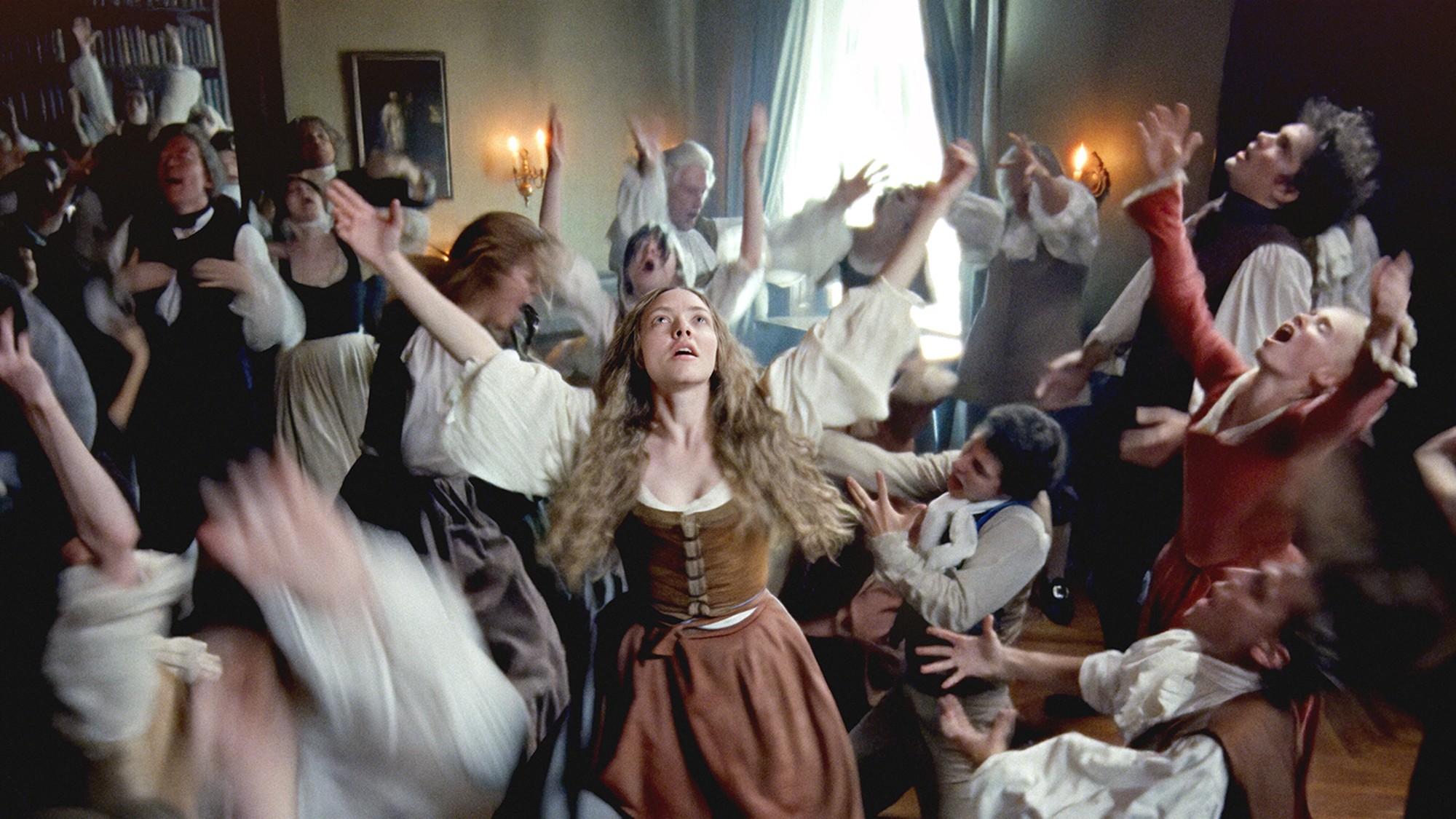Indie film's 'very brief' use of AI sparks backlash and calls for boycotts
Did the creators of a new horror movie make a deal with the artificial intelligence devil?


A free daily email with the biggest news stories of the day – and the best features from TheWeek.com
You are now subscribed
Your newsletter sign-up was successful
For a movie that takes painstaking care to recreate the vibe and aesthetics of 1970s television, the firestorm engulfing the newly released indie horror film "Late Night with the Devil" is a thoroughly modern one. Co-written and directed by brothers Cameron and Colin Cairnes, the film's depiction of a talk show taping gone supernaturally wrong had earned rave reviews after screening during last year's SXSW festival. But since its wider debut this month, many viewers and critics have focused less on the film's practical effects and chilling narrative than its use of artificial intelligence-generated images during key moments of the story.
‘LATE NIGHT WITH THE DEVIL’ seemingly uses AI-generated art for certain cutaway transitions in the film. pic.twitter.com/skzJVujskXMarch 21, 2024
The Cairnes confirmed they had "experimented with AI for three still images" in a statement to Variety last week. The stills were "edited further and ultimately appear as very brief interstitials in the film," they said, while lauding "Late Night with the Devil's" "amazing graphics and production design team." The use of AI art has still been enough to sour audiences. Letterboxd user "based gizmo" complained they "can't enjoy the amazing performances and clever ending" knowing that the film contained AI art, Variety said, crediting the review for having "kickstarted" the controversy.
Moreover, the incident has opened a broader debate over AI in cinema. "Late Night with the Devil" was filmed before last year's actors and writers strikes helped focus attention on its use in cinema and television. Even so, it has become a flashpoint as studios — and the world at large — work to navigate this contentious terrain.
The Week
Escape your echo chamber. Get the facts behind the news, plus analysis from multiple perspectives.

Sign up for The Week's Free Newsletters
From our morning news briefing to a weekly Good News Newsletter, get the best of The Week delivered directly to your inbox.
From our morning news briefing to a weekly Good News Newsletter, get the best of The Week delivered directly to your inbox.
'A major threat to artists everywhere'
The use and misuse of AI is a "fraught topic in many industries, especially at this moment in Hollywood" The Daily Beast said. There in particular, "union contracts have fought for protections against AI-assisted or -generated work" although to date those have focused on acting and writing, and don't "cover the use of it in art and illustration." To that end, "Late Night with the Devil" may be the "first feature film lambasted for AI art," CBR said, adding that similar controversies have already occurred in the comic book and playing card industries.
While AI may be a "major threat to artists everywhere," it is especially so in the film industry where if it's applied "even on a basic level to cut costs and time, that means that jobs are being cut and less people are working," No Film School's Grant Vance said. The filmmakers had "no excuse" to release the film widely with AI art, "since it had all this time between SXSW 2023 to now to hire a graphic artist," film journalist Rendy Jones said on X. Although instances of AI art in television have prompted "hollow" excuses, "we're lucky that AI is still in the phase of its development where it's relatively easy to tell when an image is, in fact, artificially generated," The AV Club said. Still, it will "be interesting to see how this decision impacts the movie's success at the box office — if it does at all."
Boycotting won't 'accomplish anything'
There has also been a notable backlash to the backlash over what some critics see as misplaced frustration. Using AI in 2022 when the film was made "wasn't quite the hot-button issue it is now," film critic Eric Snider said, cautioning that "if they use it after this, maybe then I have a problem."
Because the film was created without major studio backing, "boycotting an indie over [using AI] seems harsh," Jones said. "Where was this vitriol hate when Marvel did it last year?" The juggernaut studio used AI-generated images in the title credits of its "Secret Invasion" series. Boycotting "Late Night with the Devil" isn't going to "accomplish anything but making indie films, especially genre, harder to see in theaters," agreed film critic and distributor Justin LaLiberty on X. Raging against AI may be correct, he added, but in practice "those changes come elsewhere."
A free daily email with the biggest news stories of the day – and the best features from TheWeek.com
Ultimately, "AI is a concept, one that is implemented in many ways," The Daily Beast said, adding "the vast majority of those ways aren't just ethical, but they're also exciting."
Rafi Schwartz has worked as a politics writer at The Week since 2022, where he covers elections, Congress and the White House. He was previously a contributing writer with Mic focusing largely on politics, a senior writer with Splinter News, a staff writer for Fusion's news lab, and the managing editor of Heeb Magazine, a Jewish life and culture publication. Rafi's work has appeared in Rolling Stone, GOOD and The Forward, among others.
-
 Political cartoons for February 15
Political cartoons for February 15Cartoons Sunday's political cartoons include political ventriloquism, Europe in the middle, and more
-
 The broken water companies failing England and Wales
The broken water companies failing England and WalesExplainer With rising bills, deteriorating river health and a lack of investment, regulators face an uphill battle to stabilise the industry
-
 A thrilling foodie city in northern Japan
A thrilling foodie city in northern JapanThe Week Recommends The food scene here is ‘unspoilt’ and ‘fun’
-
 The 8 best superhero movies of all time
The 8 best superhero movies of all timethe week recommends A genre that now dominates studio filmmaking once struggled to get anyone to take it seriously
-
 Josh D’Amaro: the theme park guru taking over Disney
Josh D’Amaro: the theme park guru taking over DisneyIn the Spotlight D’Amaro has worked for the Mouse House for 27 years
-
 Heated Rivalry, Bridgerton and why sex still sells on TV
Heated Rivalry, Bridgerton and why sex still sells on TVTalking Point Gen Z – often stereotyped as prudish and puritanical – are attracted to authenticity
-
 Film reviews: ‘Send Help’ and ‘Private Life’
Film reviews: ‘Send Help’ and ‘Private Life’Feature An office doormat is stranded alone with her awful boss and a frazzled therapist turns amateur murder investigator
-
 February’s new movies include rehab facilities, 1990s Iraq and maybe an apocalypse
February’s new movies include rehab facilities, 1990s Iraq and maybe an apocalypsethe week recommends Time travelers, multiverse hoppers and an Iraqi parable highlight this month’s offerings during the depths of winter
-
 The best fan fiction that went mainstream
The best fan fiction that went mainstreamThe Week Recommends Fan fiction websites are a treasure trove of future darlings of publishing
-
 The 8 best animated family movies of all time
The 8 best animated family movies of all timethe week recomends The best kids’ movies can make anything from the apocalypse to alien invasions seem like good, wholesome fun
-
 Film reviews: ‘The Testament of Ann Lee,’ ’28 Years Later: The Bone Temple,’ and ‘Young Mothers’
Film reviews: ‘The Testament of Ann Lee,’ ’28 Years Later: The Bone Temple,’ and ‘Young Mothers’Feature A full-immersion portrait of the Shakers’ founder, a zombie virus brings out the best and worst in the human survivors, and pregnancy tests the resolve of four Belgian teenagers
